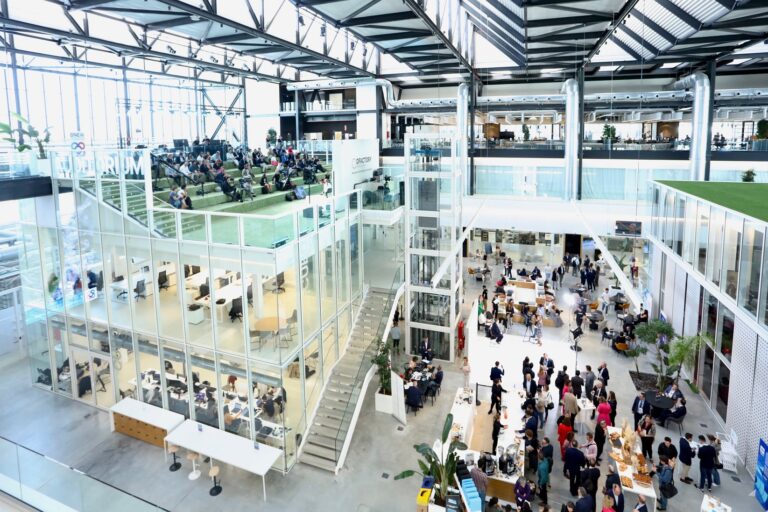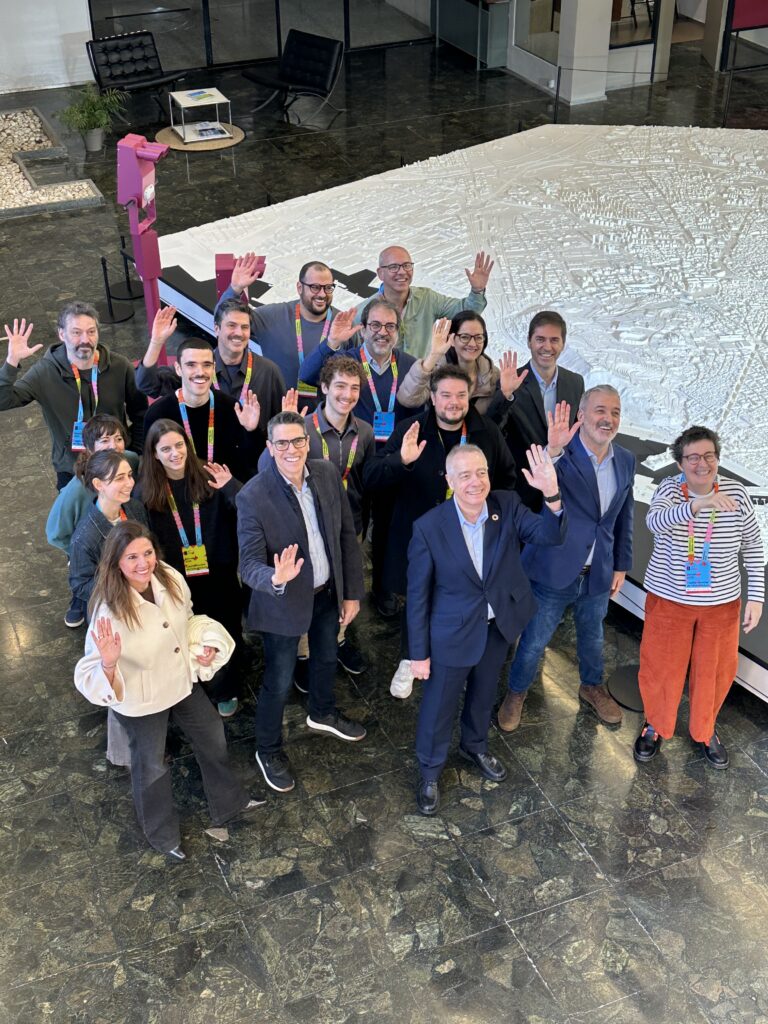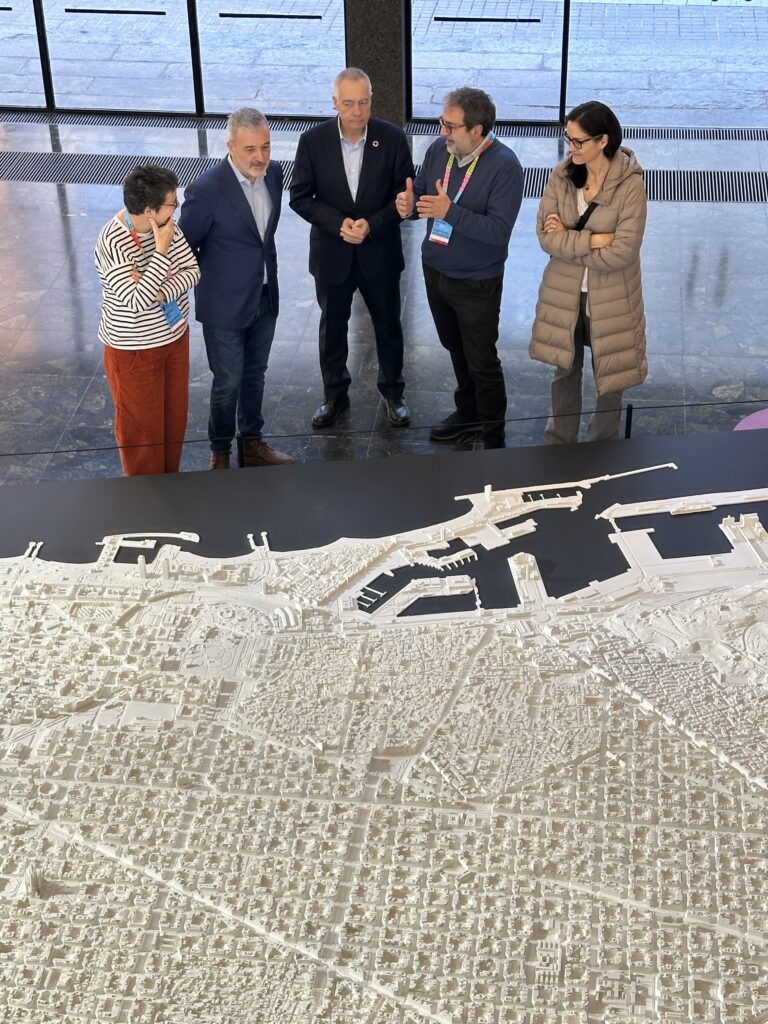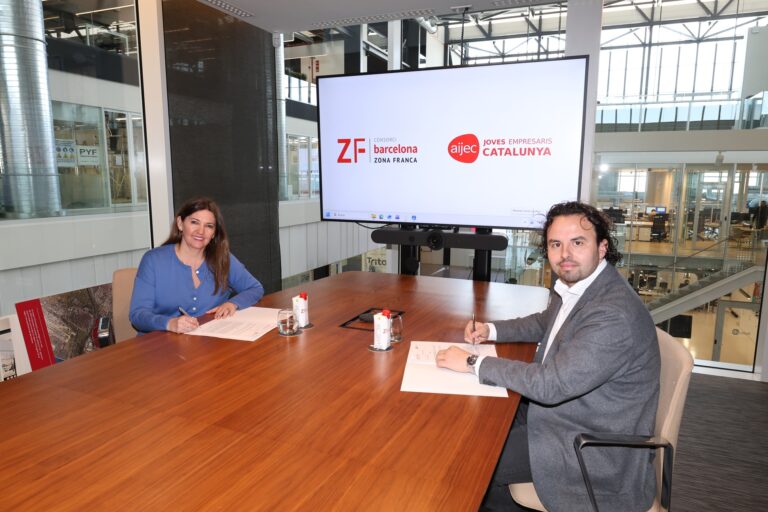BNEW 2022 concludes a successful edition with more than 12,000 professionals in attendance

6 de October de 2022
- 6,000 attendees in person and 6,500 online, in addition to nearly 5,500 networking contacts -more than 2,000 through the digital platform-, the main figures of an edition that has shown the world DFactory Barcelona, the cathedral of Industry 4.0.
- 622 speakers offered 180 hours of content distributed in 131 panels, sessions and debates.
- BNEW has thus established itself as the benchmark event for the new economy, with the participation of 1,500 startups and an international participation of 40% with attendees from 107 countries.
Barcelona, 6 October 2022. – Barcelona New Economy Week (BNEW), the hybrid disruptive event -onsite and online- of reference for the new economy, promoted by the Consorci de la Zona Franca de Barcelona (CZFB), today brings its successful third edition to a close, consolidating the city of Barcelona as the world capital of Industry 4.0.
During these four days, more than 12,000 professionals, 6,000 in person and 6,500 online, have enjoyed all the content on the new socio-economic challenges. In addition, nearly 5,500 networking contacts were established, more than 2,000 thanks to the digital platform specifically developed by the CZFB.
The 2022 edition revolved around seven key verticals: Digital Industry, Invest, Sustainability, Mobility, Real Estate, Talent and Experience. Seven major thematic areas interconnected with each other, promoting synergies between complementary areas to accelerate this global transformation.
The unique 17,000 square metre DFactory building, located in Barcelona’s Zona Franca, has become the global meeting point for key players in the new economy, bringing together 622 speakers who have offered 180 hours of content distributed in 131 panels, sessions and debates.
BNEW: a global event
The hybrid format of the event ensured that all the presentations could be followed in streaming, as well as facilitating access to international participants from more than 100 different countries, including Colombia, Ecuador, Argentina and Mexico, among others.
Barcelona New Economy Week thus concludes a third edition marked by greater attendance, reaffirming the role of the Consorci de la Zona Franca de Barcelona as a driver of industrial transformation in the move towards the 4.0 economy.
As Pere Navarro, special delegate of the State at Consorci de la Zona Franca de Barcelona, pointed out: “We are very proud to close the third edition of the BNEW with figures that demonstrate the importance of this event, unique in the world, focused on the new economy. We have contributed to generating new business opportunities, to boosting the economy and Barcelona has once again positioned itself as the epicentre of innovation, digitalisation and progress”.
Navarro also announced that they are already working on the fourth edition of the event, which will be held in 2023, and that the dates will be announced shortly.
On the other hand, Blanca Sorigué, CEO at Consorci de la Zona Franca de Barcelona and BNEW, said that “organising an event of this magnitude is a challenge and a great responsibility, but we can affirm that BNEW has consolidated itself as an essential appointment with innovation in a transversal way. It is a disruptive B2B event, which evolves year after year, and the reception it has had in its most face-to-face edition shows that it is essential to have a shared space to move towards the new economy, taking into account the key role of digitisation, sustainability and the achievement of the Sustainable Development Goals”.
Highlights of round tables
The round table “Public-private collaboration: America’s Cup”, held as part of the BNEW Talent vertical, was one of the highlights of the last day of the international event, held at the DFactory facilities. The panel, moderated by Pere Navarro, brought together experts such as Daniel Puig, vice-president of Barcelona Global; Maria Eugènia Gay, government delegate in Catalonia; Damià Calvet, president of the Port of Barcelona; and Ignasi Armengol, director general of the Fundació Navegació Oceànica Barcelona.
During the session, it was concluded that the America’s Cup will act as a catalyst to boost Barcelona’s growth, just as the 1992 Olympic Games did in its day. Daniel Puig began the round table discussion by assuring that “the America’s Cup in Barcelona was an objective of the organisation from the beginning”. For her part, Maria Eugènia Gay, added that “the private entities, with their know-how, will provide the necessary knowledge and the government, through its experience. Moreover, public-private collaboration is fundamental, not only because of its economic involvement, but also because of its social involvement”.
In reference to the global importance of this competition, Damià Calvet stressed that “the America’s Cup is the third most watched event in the world, and for the first time in history Barcelona will be the only city in the world to have hosted three games with such an impact, so it has a very high reputational value”. Finally, Ignasi Armengol explained that “The process of building the event is one of their main functions and they will act as facilitators to make the America’s Cup in Barcelona the best it has ever been. They also have an important lever for transformation in sustainability”.
One of the day’s top panels, within the framework of the Digital Industry vertical, was Europe 4.0 “Digital transformation of the economy. Opportunities and Challenges, also moderated by Navarro. Speakers included Salvador Esteban, General Director of Digitalisation and Artificial Intelligence, Ministry of Economic Affairs and Digital Transformation; José Luis Bonet, President of the Spanish Chamber of Commerce; Pedro Mier, President of AMETIC; Víctor Calvo-Sotelo, President of Digitales; Christian Hocken, Managing Partner of Industrie 4.0 Maturity Center, and Pere Navarro, Special Delegate of the State in the CZFB.
Pere Navarro moderated the session, introducing several topics of interest such as digitalisation as an opportunity and not a threat, the capacity of Next Gen funds to be more competitive, sustainability as a lever for change and the training and talent necessary to face Industry 4.0 with autonomy.
In this regard, José Luis Bonet stated that “the scenario has changed. We live in an agile and complex world in which digital transformation has been and will be a competitive advantage for companies and society“. And he concluded: “we have a good infrastructure to face the needs of this transformation, but not the digital skills”. For his part, Victor commented that “data latency, it is said, data speed, with 5G as a flagship, is essential to support digitisation and connected industry”.
Salvador Esteban, on the other hand, assured that “digitalisation opens up a multitude of opportunities. That is why we are launching measures for basic skills and employability, also with the aim of implementing the necessary skills for the professions of the future”. And he concluded: “It is essential to digitise the productive fabric, to have a robust structure of our SMEs, large companies and public administrations. Those who do not digitally transform themselves will be left out”.
Pedro Mier stated that “we need to accelerate the implementation of this transformation and channel it through European funds. It is a key tool to take advantage of this opportunity, as we have the talent, the infrastructure and the fabric to carry it out”. Christian Hocken, finally, also said: “Industry 4.0 was born after the financial crisis of 2008 in order to seek to strengthen skills and improve competitiveness in this sector. Now we have new horizons such as efficient implementation, connectivity and automation”.
On the other hand, the round table “Empowered Women = competitive companies”, framed in the vertical BNEW Sustainability, moderated by Blanca Sorigué, generated great interest. The panel included the participation of Teresa Bustos, president of Entalenta; Anna Sorli, founder of Somia; Mireia del Pozo, President of the Centre for Women’s Studies in Europe; and Adriana Rubio, president/general manager at Roche Diagnostics.
The panel discussed the key role of women in the new economy and the need to promote training in STEM (science, technology, engineering and mathematics) professions.
Adriana Rubio stated that “it works very well to create mentoring programmes for women and to give them visibility and accompany them in their development. Opportunities must be created consistently and sustained over time”. In addition, Anna Sorli assured that “now the company has a more horizontal vision, we must encourage sharing and not competing, to achieve a more human company that is open to the world“.
On the other hand, in the words of Teresa Busto: “we have to work on the empowerment of women. It is no longer a question of skills, we have to believe that we are capable and that we do not have a glass ceiling”. Finally, Mireia concluded, “training is the path to real action. We are talking about talent and not just gender. We have to run this race together, both men and women”.
The BNEW has a website with all the information about the event, as well as more news on Twitter and LinkedIn profiles.
BNEW 2022 HIGHTLIGHTS
12,368 professional attendees:
- 5,927 in person
- 6,441 online
40% international registrants from 107 countries (main ones: Colombia, Ecuador, Argentina and Mexico)
5,563 networking contacts made:
- 3,375 face-to-face
- 2,188 digital
180 hours of content
130 sessions
622 speakers
74% agreements with sector associations and clusters
21 sponsoring companies
1,500 start-ups participated
Nearly 300 direct jobs generated
700 indirect Jobs



